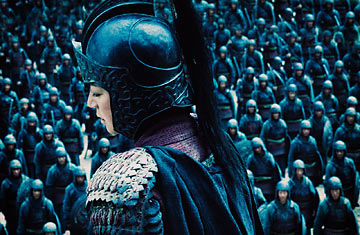
A scene from Hong Kong director Jingle Ma's Mulan
China is moving to take back one of its own — even if it is legend. Mulan is the Middle Kingdom's gender-bending heroine, its Joan of Arc. The character from folktale is a daughter who disguises herself as a male soldier to take her father's place in the conscription army. The problem for the Chinese is that, since 1998, the definitive version of the story has been Disney's.
Indeed, because of the animated Disney film, the character Mulan has become one of the most recognizable symbols of Chinese culture worldwide. Baby girls adopted from China have been named Mulan by their American parents. Disney has staged musical versions of the movie Mulan from Mexico to the Philippines. And posing for a photo with Mulan is a must for hordes of tourists at Hong Kong Disneyland.
Although it was too American for audiences in China (where it performed abysmally), Disney's Mulan was a smash hit in the rest of the world, where it reeled in $300 million. That didn't sit well with some Chinese, including Guo Shu, executive president of Starlight International Media Group, an entertainment company based in Beijing. "We commit ourselves to be a media with a sense of national responsibility," she told the state-run People's Daily. "Now that foreigners can produce a popular movie out of the story Hua Mulan, why can't we Chinese present its own to the world?"
In 2006, she announced the production of a Chinese Mulan, and now that version has opened to reclaim the global Mulan-mania. On Nov. 27, the $12 million, mainland-funded live-action war epic premiered in mainland China, Singapore and Malaysia. It will hit screens in Hong Kong this week, and negotiations are on the table for release dates in the U.S. and Europe.
The film's Hong Kong director, Jingle Ma, says the new 115-minute Mulan is a sweeping melodrama that depicts the central character as an action hero, dutiful daughter and wistful romantic. The film stars Vicki Zhao Wei, who shot to fame in the late 1990s playing the wide-eyed lead role in the television series Princess Pearl. Zhao may have gotten the role because of her tomboy image in action films such as Red Cliff and So Close, but in Mulan, she appears with full makeup and long, glossy fingernails — even as a soldier.
While the Disney film wove comedy into a Disney-esque plot about a young girl breaking out of the confines of tradition to pursue her own destiny, the new Mulan focuses on patriotism, filial piety, romance and the difficulties of war. The formula is part of an evolving mainland genre that has seen filmmakers incorporating more nuanced, entertaining storytelling into patriotic plots. "China is anxious to be part of the global community. There's a lot of concern over soft power right now," says Poshek Fu, professor of cinema studies at the University of Illinois at Urbana-Champaign. "Movies are a strong projection of that desire."
The new Mulan is at least the 10th film version of the Hua Mulan tale ("Hua" is the heroine's surname). Many of the previous films — like Mulan Joins the Army, released in 1939 in Japanese-occupied Shanghai — carried political messages during turbulent periods in the country's history. In 1956, after the Communist Party had banned American films and nationalized the country's film studios, a state-sponsored Hua Mulan was released, touting the party's egalitarian gender policy. After many Chinese filmmakers fled communist-controlled China, the Shaw Brothers studio in Hong Kong gave overseas Chinese audiences a vision of a unified China in its 1963 film The Lady General Hua Mulan.
The latest Mulan is not the only post-Disney attempt to remake the folktale. In 2003, there was talk of a version starring Michelle Yeoh and Chow Yun-Fat. In 2006, the Weinstein Co. announced a big-budget Mulan film that would star Zhang Ziyi. Director Ma says his version comes at just the right time. "Eleven years ago, just because someone else made this film didn't mean that we had to come back and make our version right away," he says. "It was better to wait for things to cool down before we made our own Mulan. Back then, the Chinese market wasn't mature yet, but now it's ready."
But there's a foreign presence even in this Chinese attempt to take back its own. The Russian entertainer Vitas plays the role of a singer from a distant land held hostage by the nomadic and militant Rouran tribe, which is set on invading Chinese territory. The casting choice, Ma explained, was a simple marketing decision. Starlight International represents Vitas in China. And, who knows, the Russian actor could be key to the new Mulan's conquest of foreign audiences. Take that, Disney.
